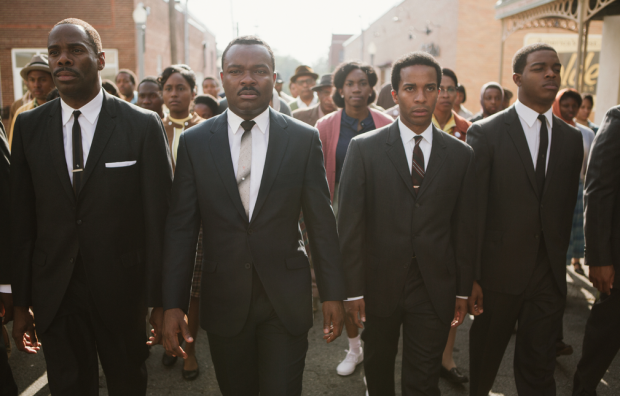There are certain figures in history that are so endlessly studied, referenced, and revered that their name alone conjures the narrative of an entire movement or era, so much so they can seem untenable. Such is certainly the case with civil rights activist, leader, and pastor Martin Luther King, Jr. While those descriptors are rightfully apt, in Ava DuVernay‘s studio debut, Selma, we witness the figure as an empathetic husband, friend, father, and, simply, a man with deep-rooted struggles, both in his life and the lives he hoped to change.
This significant portrait is all the more remarkable considering the comparatively brief period of time the film witnesses in his regrettably short-lived life. Tracking the turbulent weeks leading up the march from Selma to Montgomery to secure the passage of the 1965 Voting Rights Act — shockingly, the first time these events have been given their proper due on film — Selma is a drama much more concerned with the process of struggle than the result of victory.

Portraying Martin Luther King, Jr. is David Oyelowo, who gives a towering performance when called upon — delivering vigorous speeches in the pulpit and on the streets — but also a tender one, whether it’s portraying emotional vulnerability in admitting weaknesses to his wife (Carmen Ejogo‘s Coretta Scott King) or cracking jokes during a home-cooked meal to his most-trusted entourage of allies (portrayed by Colman Domingo, Wendell Pierce, André Holland, and more, a group one wishes received more time to be fleshed out).
With a multitude of moving parts, one must credit director Ava DuVernay for letting most of the other supporting characters receive their due. In the opening scenes Annie Lee Cooper (Oprah Winfrey) shows the difficult process of attaining the right to vote on a micro level, while later, members of a competing civil rights movement are shown debating internal struggles with King now at the forefront of the movement. In one of the film’s most gut-wrenching sequences we witness his genuine heartache when it comes to the death of a young activist (Keith Stanfield), an aspect of the civil rights movements too easily glossed over when provided with the standard history lesson of the figure.

The government officials (Tim Roth, Giovanni Ribisi, Tom Wilkinson, Dylan Baker and Martin Sheen) range from almost downright cartoonishly evil to deeply conflicted as the gatekeepers for progress in this movement. DuVernay excels the most with King’s relationship with President Lyndon B. Johnson (Wilkinson) as she showcases the former’s initial measured attempts to enact change and the necessary crusade to rally for it when it clearly wasn’t given priority. Also well-executed are the time-stamps through the film; instead of perhaps the rote title cards in a typical biopic, we’re given updates on the FBI’s monitoring of King’s every step, bringing another layer of threat to King’s struggle.
Reteaming with DuVernay, cinematographer Bradford Young‘s work is, once again, exemplary. Capturing events with a wide, anamorphic lenses we get a vignetted, historic feel to King’s most prominent moments matched with a visceral immediacy in sequences of violent conflict. Emphasizing the effects of violence rather than the act itself, it’s a testament to the film’s PG-13 rating that DuVernay doesn’t rely on horrific imagery to easily sway us, instead focusing on the emotional toll it takes on the characters and the movement at hand.
By balancing both the large-scale aspects of conflict with news coverage, political roadblocks, and the marches (unexpectedly, but expertly using actual footage), and the small-scale disputes with internal dialogue and the vital, sometimes dissenting decisions a leader must make, DuVernay has crafted a film that thoroughly depicts the necessary, calculated elements to incur change. An intensely intimate, spiritually rich depiction of a struggle that has unfortunately endured to the present, Selma yields a scene-to-scene emotional current like no other film I’ve experienced this year. Taken as a whole, it’s a deeply affecting, incendiary film and the most focused, accomplished biopic in a year of numerous offerings.
Selma is now in limited release and expands nationwide on January 9th.

